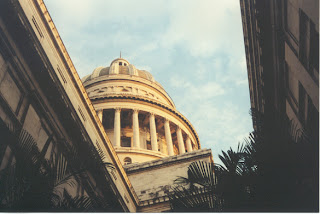
Politics later.
Let’s start with a joke.
“I came by land to see that everything is green and beautiful, but the most beautiful thing, that which most caught my eye, was how pretty the marabu is all along the highway.”
That’s Raul Castro explaining that he drove hundreds of miles rather than fly to Camaguey, where he spoke on Cuba’s national holiday, on the one-year anniversary of Fidel Castro’s last public appearance.
Marabu is a weed that takes over untilled fields. I don’t know exactly how he meant this joke, which certainly differs from Fidel’s style, and which EFE’s correspondent reported was greeted by laughter throughout the crowd. But my guess is that it’s a muy popular way of expressing dissatisfaction with the state of agriculture because, as any Cuban farmer knows, marabu in your fields is a sign of idleness and failure. Or maybe he was alluding to “Plan Marabu,” a term Cubans jokingly use to refer to the sugar ministry’s so-far-unsuccessful plan to turn idled lands over to other crop production. Marabu thrives unchallenged in lots of former sugar fields right now.
Anyway, now to the politics.
I have to think this speech marks a turning point for Cubans, sort of as if Americans were to see a Vice President giving the State of the Union address after a President was ill and out of sight for many months.
Raul gave a serious, presidential address, not a quick 15 minutes that an interim leader would deliver if he were still concerned about appearing to move too boldly into the absent leader’s space. Fidel’s name was invoked aplenty, and a book of his “Reflections” was published in Camaguey. For all the reverence, I saw not a word that would create an expectation of Fidel’s return.
Yet Fidel’s presence seems unmistakable, and not simply in the sense Raul described of his brother never failing “to bring his wisdom and experience to each problem and essential decision,” even “during the most serious moments of his illness.”
It was apparent in the gap between the problems Raul Castro described and the measures that have so far been brought to bear to address them. Fidel may be phoning it in, but his philosophy still seems to reign.
A Cuban worker’s salary, Raul said, “is clearly insufficient to satisfy all necessities, and hence has practically stopped fulfilling the role of assuring the socialist principle of each working according to his capacity and receiving according to his work.” That failure brings “social indiscipline” – read petty theft and black market activity to make ends meet – that is “difficult to eradicate.” “We know the tension to which party cadres are subjected, especially at the base, where available resources are almost never enough to cover accumulated needs.”
The solution, he said, lies in higher productivity, revived industrial production, increased foreign investment, and even “structural changes and changes of concepts.” And the solution will not come immediately because “no country has the luxury of spending more than it has.”
When Fidel Castro spoke about Cuba’s expansive black market in 2005, describing it as a threat to socialism’s long-term survival, his prescription was clear: stamp it out by enforcing the law and raising ideological consciousness. By contrast, Raul says black market activity is a direct response to the state’s inadequate pay. There’s a big difference between blaming greed or insufficient revolutionary qualities, and saying people deserve a day’s pay for a day’s work.
And there was more, including a passage where Raul fairly ridiculed the bureaucracy of milk production. “For years we have said that milk is supplied to children up to age seven,” he said. “What must be done is to produce milk so that anyone who wants can drink a glass of milk.” How many speeches are there – thousands? – where Cuba’s guarantee of milk to children is described as a triumph. Raul held it up as a sign of inadequacy.
In the past year Raul has certainly set a different style and he has changed some government policies. A brief but vibrant debate erupted in the cultural sector about repression in the 1970’s. He saw to it that the government paid its debts to farmers, and he raised prices paid to producers for milk and beef. He promised investment in tourism facilities and cut some abusive pricing that was contributing to reduced tourist visits. He allowed video equipment and auto parts and engines to be imported, and reportedly Cuban customs has reduced taxation and confiscation of Cuban Americans’ luggage containing goods for family members. He approved new labor regulations requiring greater worker discipline, and set in motion a study of the salary structure to find a way to pay workers enough to cover basic needs. There’s a rumor that Cubans may be permitted to stay in tourist hotels, and there was this sentence in a New York Times report which, if true, would be a small but very dramatic sign of a change in direction: “He has told the police to let pirate taxis operate without interference.” (Fidel threatened to put them out of business because they guzzle gas.)
These moves all make sense and many will improve public welfare. But they are small, marginal steps in relation to what would need to be done for Cuba to bridge decisively the income gap between underpaid state workers and those who work in tourism, joint ventures with foreign investors, individual licensed entrepreneurship, private farming, and a few other lines of work.
So Raul described large problems that are of great interest to average Cubans. His actions during the past year give the impression of a policymaker with limited room for maneuver. Nonetheless, he is creating public expectations that some kind of change is coming, and that in time it will measure up to the challenges he himself has defined.
He closed by quoting his brother, seven years ago: “Revolution is a sense of the historical moment, it is to change all that must be changed.”
Chew that one over.
Finally, a word about the United States since we are, of course, the center of the universe.
Alas, we were not at the center of this speech. In spite of the amount of press coverage Raul’s comments on U.S. relations with the United States received, those comments seemed perfunctory to me, a genuine but pro forma reiteration of policy, with a shot at the “erratic and dangerous” President Bush.
Raul offered an “olive branch” – but to the next Administration, which takes office in 18 months.
He has written off the Bush Administration.
The man has work to do, after all.
[AP photo]
 Have they taken that old
Have they taken that old  “No problem” is not exactly right.
“No problem” is not exactly right. 






















